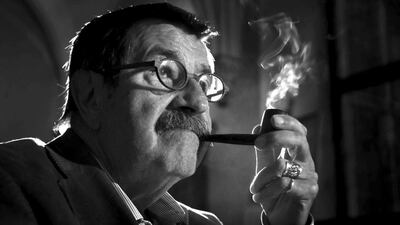Günter Wilhelm Grass died in hospital in the German city of Lübeck on Monday, at the age of 87. Born in Danzig, Germany – now Gdansk, Poland – Grass had been a giant of German letters since the publication, in 1959, of The Tin Drum, a story told in a zone between expressionism and magic realism that the author called "broadened reality". His hero, Oskar, is a child witness to the rise of Naziism, whose reaction is to stop growing and speaking. The sound of his voice can shatter glass, and his drum can make anyone dance to his tune.
Just 12 at the beginning of the Second World War, Grass himself later became a powerful and controversial voice on German politics and history, but it is too simple to find a parallel for his life in his book. When he won the Nobel Prize in Literature in 1999, the Academy praised him for exposing the attitudes that led to the atrocities of Nazi Germany with "cheerful destructiveness". It was only in 2006 that Grass admitted, in his autobiographical work, Peeling the Onion, to enlisting in the Waffen-SS at the age of 17 during the final year of the war, overturning his previous claim to have been no more than a "flakhelfer", or anti-aircraft auxiliary. "I kept silent," he said in Peeling the Onion. "But because so many kept silent, the temptation is to discount one's own silence."
Post-war, Grass trained as a painter and sculptor in Düsseldorf and Berlin (he designed many of his own book-jackets), and wrote poetry, which he illustrated. In the 1960s he entered politics, for 10 years writing speeches for Willy Brandt and campaigning for the German Social Democrats. The Tin Drum was followed by the two other novels in his Danzig Trilogy: Cat and Mouse (1961) and Dog Years (1963), then, among others, From the Diary of a Snail (1972), The Flounder (1977), The Meeting at Telgte (1979), Headbirths, or The Germans are Dying Out (1980), Show Your Tongue (1989) and A Wide Field (1995).
For an author so engaged with politics, he had as many supporters as detractors. He was against the deployment of American nuclear weapons in Germany, a critic of both Soviet repression and of the treatment of Eastern Germany by its western counterpart on unification in 1990. He denounced the Roman Catholic and Lutheran churches as complicit with war crimes; he resigned from the Berlin Academy of Arts (he was president from 1983 to 1986) and even, eventually, the Social Democratic Party.
"There is war everywhere; we run the risk of committing the same mistakes as before," Grass said in an interview with Spanish newspaper El País published on Tuesday. One of his last political acts was to sign the PEN International petition supporting freedom of expression in Turkey.
The stripped-down language of his books was a careful refusal of the sentimentalism of the propaganda he experienced during his early years.
“He was the 20th century,” said Nobel juror Per Wastberg. The German chancellor Angela Merkel said he “accompanied and shaped Germany’s postwar history with his artistic as well as his social and political engagement”.
In his writing, and his life, he took the almost impossible role as a conduit for Germany's shame, and its redemption. If his art is remembered as an expression not only of his politics but also of a nation's, it seems unlikely he would have refused this evaluation. "This 'fiction versus non-fiction' business is nonsense," he told the Paris Review in 1991 (before his revelations regarding his wartime activities). "Writers are involved not only with their inner, intellectual lives, but also with the process of daily life."
His artistic achievement, impossible to separate from his politics and those of his country, has also been celebrated. German minister for culture Monika Grütters ranked him with Goethe. A fellow Nobel laureate, the Austrian writer Elfriede Jelinek, whose work also concerns the ways in which national repression plays out in personal experience, called him her first role model, saying: "The Tin Drum, when I read it as a young girl, was, for me, the beginning of a new language in literature. At that time I realised that literature is not simply telling or writing, but can create its own laws, from the needs of a text."
Before his death he was working on a final book, which will be published this summer.
Joanna Walsh is a UK-based writer. She edits at 3:AM magazine and runs @read_women.

